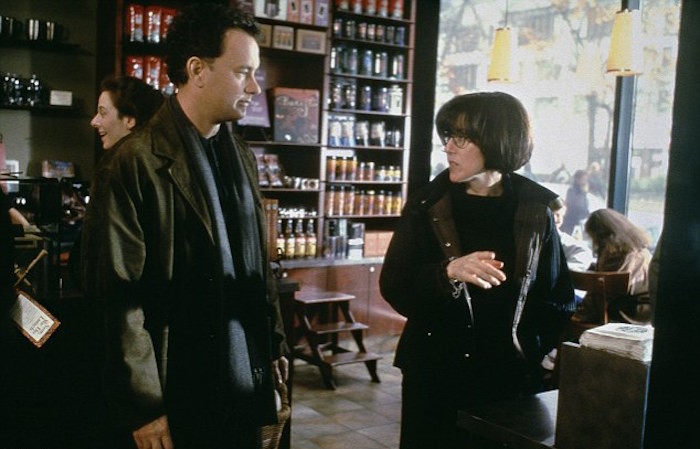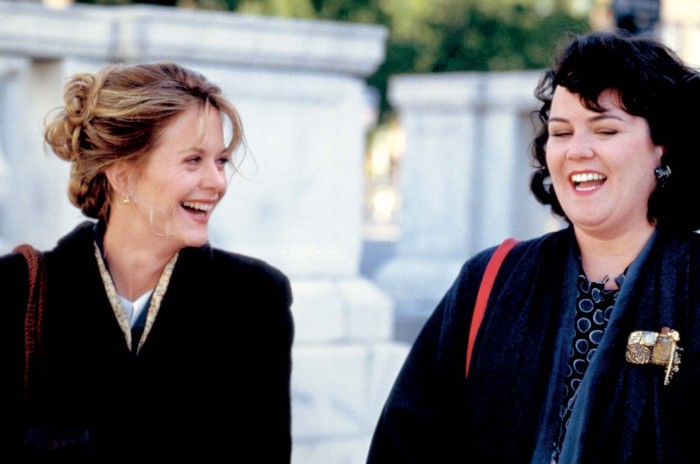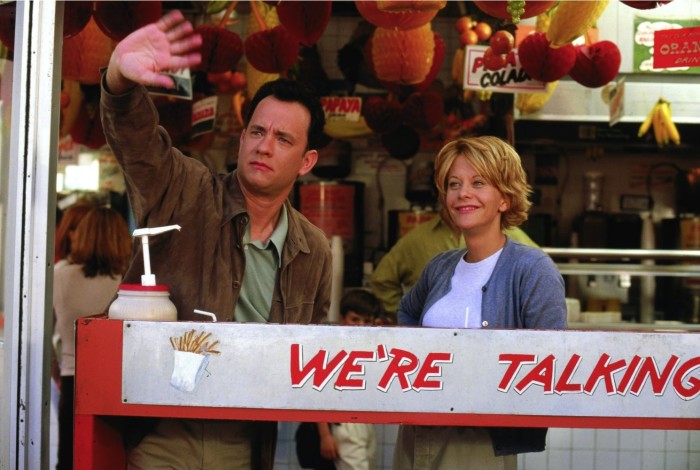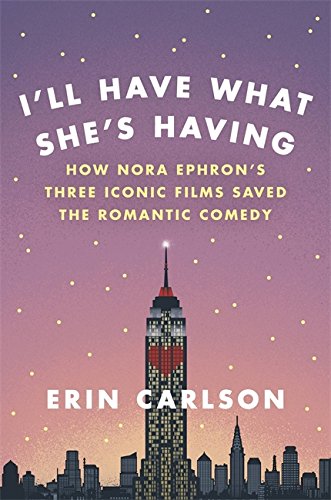'I'll Have What She's Having' Is A Wonderful Love Letter To Nora Ephron, But A Short Postscript To Rom-Coms
When I first saw When Harry Met Sally the summer after middle school, I thought it was revolutionary. No romantic comedy I'd seen before was so frank, so funny, so real. Admittedly, my rom-com education had been lacking up until then, primarily filled by early Kate Hudson and Jennifer Lopez schmaltz. It's no exaggeration to say that Nora Ephron changed how I viewed romantic comedy.
Erin Carlson's I'll Have What She's Having: How Nora Ephron's Three Iconic Films Saved the Romantic Comedy makes just that conclusion as well — on a much broader scale. Carlson's book, which explores Ephron's unlikely rise from acerbic essayist to the queen of romantic comedy, turns a loving eye towards her three most famous movies and the people behind all their moving parts. It's a nostalgic, frothy read punctured by moments of insight from Carlson and melancholy from Ephron's own life, as well as the underlying struggle of female creatives in the male-dominated Hollywood.
But as much adulation as I'll Have What She's Having gives to Ephron, Tom Hanks, Meg Ryan, and Ephron's so-called New York Trilogy, the book seems to have a dismissive view of the rest of the rom-com genre. Carlson scorns the "Disney" happy ending just as much as she elevates the "fantasy" of Ephron's films, and in doing so, doesn't really answer the question of whether Ephron's "three iconic films saved the romantic comedy." Luckily the first part of the title — the behind-the-scenes peeks into the productions of When Harry Met Sally, Sleepless in Seattle, and You've Got Mail — more than makes up for that.
There’s Something About Nora
Carlson gives a detailed account of Ephron's childhood under the tutelage of two playwright parents, Henry and Phoebe Ephron, as well as Ephron's own troubled marital history, which would ironically spur her to become one of the most renowned romantic comedy directors. Carlson empathizes with Ephron's accounts of her insecurity in her mousy brown hair and angular features — more Audrey Hepburn than Marilyn Monroe — and how they become an essential part of her identity, like the erudite New York City that she's drawn to.
Carlson draws heavy connections between Ephron's own marital bliss and the slow sweetening of her films. While her autobiographical Heartburn was Ephron at her most acerbic, Sleepless in Seattle and You've Got Mail both came into being when Ephron was long happily married to screenwriter Nicholas Pileggi. When Harry Met Sally was kind of a happy in-between, and Carlson gives us the fascinating tidbit that the film was not supposed to have that rom-com ending after all — instead they would have run into each other in New York five years later. Nora put as much of herself into Sally, and her other heroines, as she did in her autobiographical film. "Nora vouched for a reconciliation worthy of our heroine because the writer had actually placed herself in Sally's sensible shoes..." Carlson writes.
But as much as Ephron projected herself into her heroines, she was in control — sometimes to a fault. The meticulous director micromanaged every aspect of her production, sometimes causing her to clash with assistants or designers if they didn't speak "Nora's language." And despite what many may think, that language wasn't that of saccharine romance but "battery acid," Carlson writes, getting to the core of who Ephron was as a female writer hyper-aware of the differences in her gender, and able to write a good joke about it.
What Women Want
"You couldn't have sex in a movie in the '30s and '40s, so how did people have sex with one another?" Nora Ephron said in a press conference for the famously chaste Sleepless in Seattle. "They talked to each other. That was the sex."
More than a little disdain is shown toward the sex-driven male fantasy films of the '80s and '90s like Basic Instinct by Ephron, and by proxy, Carlson. Ephron is an old soul, Carlson argues in I'll Have What She's Having, appreciative of the Jimmy Stewarts and Cary Grants of old. But what of everything in between?
Aside from a few mentions that take up about half a page toward the end of the book, I'll Have What She's Having shows little to no interest in other rom-coms outside of ones starring Jimmy Stewart or Nora's own love of Pride and Prejudice. There's no in-depth history of how the screwball comedy morphed into a genre that seemed to cater solely to women — when before, It Happened One Night was deemed a classic by all genders. I wanted to learn about the romantic-comedy landscape upon which When Harry Met Sally thrust itself into the limelight with its infamous Katz Deli "O" scene, but instead Carlson offers up a few weak comparisons to Woody Allen films.
The most disappointing thing to me was that Carlson took a patronizing tone towards romantic comedies with a cheesy, gooey center that weren't made by Nora Ephron. Yes, Ephron has a self-deprecating, humanizing grasp of dialogue that sets her films apart from the rest, but that's no reason to brush off all other romantic comedies that give into that Disney "happily ever after" sensibility. Carlson fails to tap into the reason that rom-coms are seen as less intellectual because they hinge on emotion and empathy — qualities seen as inherently more feminine and weak. It's why When Harry Met Sally is elevated above her other films in critical circles, because it masks that emotion and empathy with dry humor and pseudo-intellectual dialogue. But at the end of the day, Harry and Sally did get their happy ending (after 12 years and three months).
The book lives up to the first part of its subtitle, but chooses to fixate on the small details of movie production and development rather than "how it saved the romantic comedy" — there's no grand analysis of the genre that a rom-com fan would enjoy. This is great for movie industry buffs, but maybe not for casual readers and fans of your average cheesy Jennifer Garner film.
Not a Hollywood Happy Ending
The book lightly skirts the gender politics of the standard upon which Nora's own films are held. Is it bittersweet that her most acclaimed film, When Harry Met Sally, is deemed worthy of classic status because it is directed by a man, Rob Reiner? Even then, When Harry Met Sally was called Woody Allen lite, as Carlson recounts — with Ephron forever being compared and deemed lesser to her male peers.
But by becoming the Queen of Romantic Comedy, Ephron did, by extension, make it better for women directors. "Surely a male director of Nora's promise would have been allowed second and third chances following a disastrous outing, but as any female filmmaker would tell you, it's harder for women than men to regain footing after a failed directorial effort," Carlson writes. "So often they've got one shot to prove themselves, and if they blow it, or don't add to the bottom line off the jump, their time is up."
It's after Ephron that rom-coms become a safe space for female directors, with directors like Nancy Meyers, Penny Marshall, and Amy Heckerling following her example. While this grew to be limiting years later when female directors would be deemed only suited toward rom-coms, it made it somewhat easier for women to break into the movie industry.
Unlike the fantasies that Nora created in her rom-coms, there's not much of a happy ending in this book. I'll Have What She's Having paints a bittersweet portrait of how merciless Hollywood can be to former America's sweethearts, with Meg Ryan never escaping the ingenue roles while Tom Hanks' career reached new heights. And while Ephron flourished long after she made the influential New York Trilogy, coming back with Julie and Julia, which earned star Meryl Streep a variety of acting nominations, her legacy was cut short due to complications from acute myeloid leukemia.
Conclusion
Ephron lives on in the Sallies, Annies, and Kathleens of the world — adult women in romantic comedies made for adults. Beneath the cynicism and acidity that Ephron brings to her dialogue and characters, there's a rawness and vulnerability to her movies that make her films stand the test of time. At least, that's what I wish Carlson had said.
Carlson loads her book with small details of industry insight that are entertaining for avid movie industry followers and are explained in a way that feels both secretive and accessible. The incredibly minute details range from interesting to irreverent — there's a full page dedicated guy Nora dated who became the basis for half of the name of Greg Kinnear's character in You've Got Mail — but I'll Have What She's Having feels like it's missing that "eyes lock across the room" moment, that "faked orgasm in a deli" scene. The theme that brings this whole book together. I'll Have What She's Having is so focused on the details that it loses sight of the bigger picture.
It is with a deep abiding love for the genre that I wish Carlson had more greatly explored rom-coms themselves. The book lives up to the first part of the title but falls short of the second part. Did Nora Ephron's three great rom-coms save the genre? Like her films' questions about friendship, destiny, and conflict, perhaps we'll never know. But finding out sure is fun.
***
I'll Have What She's Having: How Nora Ephron's Three Iconic Films Saved the Romantic Comedy is available on Amazon.




